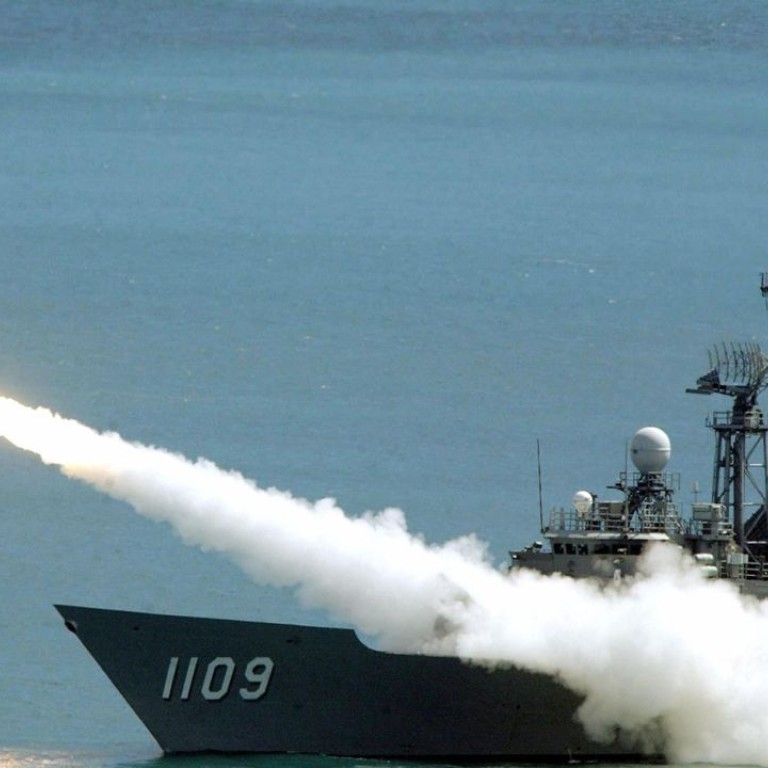
Update | Mainland China summons US envoy to protest over sale of warships, arms to Taiwan
China has summoned a senior US envoy in Beijing to protest against a US$1.83 billion arms sale to Taiwan.
Vice Foreign Minister Zheng Zeguang was cited by the state-run news agency Xinhua as telling US charge d’affaires Kaye Lee that Beijing has decided to take measures including imposing sanctions against American companies involved in the deal.
“Taiwan is an inalienable part of China’s territory. [Mainland] China strongly opposes the US arms sale to Taiwan,” Xinhua quoted Zheng as saying.
Read more: US and Taiwan bolster military ties as Beijing flexes muscles in region

Taiwan’s Presidential Office and the Ministry of Foreign Affairs welcomed the arms sale.
It indicated “that US-Taiwan relations have never been better”, they said.
The self-ruled island will vote for a new president on January 16.
Tsai Ing-wen, the presidential candidate of the main opposition Democratic Progressive Party, said the arms sale was unrelated to Taiwanese politics and was to meet the island’s defence.
China staunchly opposes America’s sale of arms to Taiwan
The US State Department said on Wednesday it intended to sell Taipei two Perry-class frigates, Javelin anti-tank missiles, TOW 2B anti-tank missiles, AAV-7 Amphibious Assault Vehicles and a range of other military equipment.
The US State Department said Raytheon and Lockheed Martin were the main contractors in the sales.
It was not clear what impact sanctions might have on the companies, although in 2013 Lockheed Martin signed an agreement with the Thailand-based Reignwood Group to build an offshore plant to provide energy for a luxury resort on Hainan island in southern China.
Read more: ‘We are brothers’: Xi hails closer ties with Taiwan as closed-door talks with Ma wrap up at historic Singapore summit
Professor Wang Yiwei, an American studies expert at Renmin University, said Beijing was now more capable of imposing sanctions on American companies.
“In 2009, Beijing also vowed to put sanctions on American companies, but it didn’t take any action finally. However, today’s China is more capable,” he said.
“Lockheed Martin and Raytheon have Chinese business partners. If Beijing really wants to take action, it will harm those companies.”
Lockheed Martin agreed to pay US$13 million to the US government in 2000 to settle a case involving the sale of satellite technology to China in 1994 after the company was charged with violating arms export laws.
Jia Qingguo, a Peking University international relations professor, said Washington had tried to choose a less sensitive time to finalise the arms deal.
“The arms sale deal was predictable as it had been studied and postponed for a long while,” Jia said.
The Obama administrations wanted to avoid announcing it during President Xi Jinping’s official trip to Washington in late September or last week’s climate change summit in Paris to prevent embarrassment in Beijing.
He said Washington had finalised the deal before the self-ruled island’s 23 million people vote for a new president next month.
“The arms sale to [Taiwanese President] Ma Ying-jeou before he leaves office is much better than directly handing over to Tsai Ing-wen,” Jia said.
Tsai is the front runner in opinion polls ahead of next month’s election.
The White House said the arms deal followed previous sales notifications by the administration totaling over US$12 billion under the Taiwan Relations Act.
Taiwan’s presidential office and foreign and defence ministries said in separate statements that the US arms deal, expected to come into force in a month, was the fourth during President Ma Ying-jeou’s presidency and the third overseen by the Obama administration.
Relations between Beijing and Taipei have warmed under current Taiwanese president Ma Ying-jeou of the Kuomintang party, but mainland China refuses to renounce the right to use force should Taipei move to declare independence formally.
China and Taiwan split at the end of a civil war in 1949.
Additional reporting by Reuters, Agence France-Presse and Associated Press

